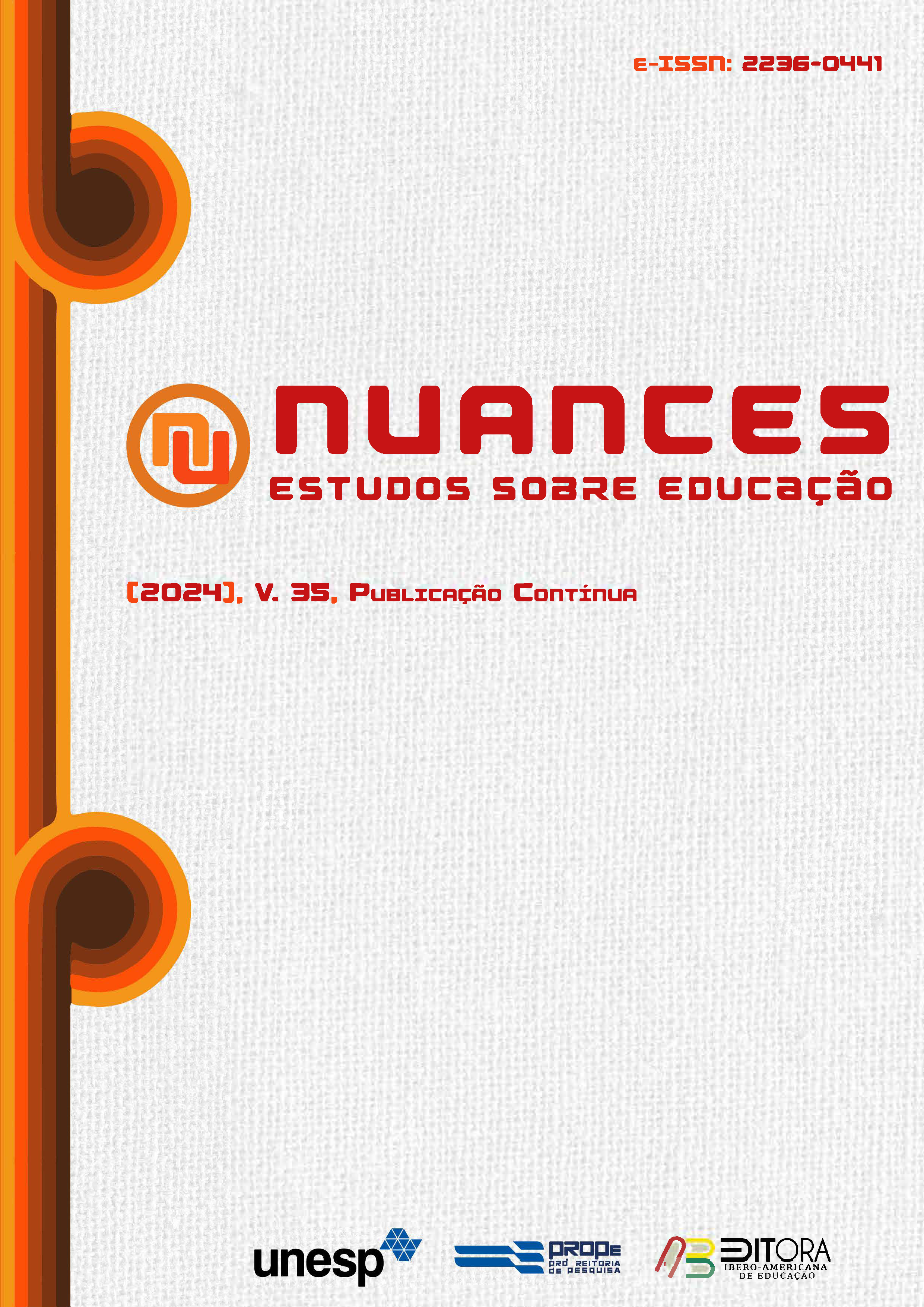Utilização de linguagem obscena entre os jovens
DOI:
https://doi.org/10.32930/nuances.v35i00.10657Palavras-chave:
Linguagem obscena, Jovens, Profanidade, DiscursoResumo
O estudo centra-se no uso de palavrões entre os jovens modernos, realçando os seus aspectos psicológicos, sociais e educativos. Os autores utilizam uma abordagem metodológica mista, combinando inquéritos quantitativos e entrevistas qualitativas com estudantes da Universidade Industrial de Tyumen (Tyumen, Rússia). Os autores propõem uma classificação das razões que levam os jovens a utilizar linguagem obscena e determinam as suas especificidades. As razões psicológicas subjacentes ao uso de palavrões incluem a necessidade de integração, atenção, catarse, auto-expressão e liberdade. O significado teórico e prático do estudo reside principalmente na recolha, sistematização e generalização de material sobre linguagem obscena e na elaboração das razões para o seu uso. O estudo fornece uma base para sessões de formação destinadas a desenvolver a cultura da fala dos alunos, a desenvolver as suas capacidades de autorregulação e a aliviar a tensão em situações de stress. Os resultados podem ser utilizados por psicólogos, linguistas e professores no trabalho preventivo e educativo em organizações educativas.
Downloads
Referências
BANDURA, A. Social Foundations of Thought and Action: A Social Cognitive Theory. Prentice-Hall, 1986.
DEBRAY, C. Swearing, identity and power in professional interaction. Journal of Pragmatics, v. 215, p. 145–158, 2023. DOI: 10.1016/j.pragma.2023.07.002.
GARIAEV, P. P. Volnovoi geneticheskii kod. Moscow: Izdattsentr, 1997. p. 108.
GRISHEVA, K. A.; KONDRATEI, M. V.; TKACHENKO, V. V. Nenormativnaia leksika, osnovnye faktory ee upotrebleniia. Young Scientist, [S. l.], v. 6, n. 65, p. 654–658, 2014.
HUSAIN, W.; WASIF, S.; FATIMA, I. Profanity as a Self-Defense Mechanism and an Outlet for Emotional Catharsis in Stress, Anxiety, and Depression. Depression research and treatment, 8821517, 2023. DOI: 10.1155/2023/8821517.
LEVIN, I. I. Ob obstsennykh vyrazheniiakh russkogo iazyka. In: LEVIN, I. I. Izbrannye trudy. Poetika. Semiotika. Moscow: Iazyki russkoi kultury, 1998. p. 809–919.
MITIN, A. N. Tot, kto pervym obrugal sopernika, zalozhil osnovy sovremennoi tsivilizatsii [The first man to swear at his rival laid the foundations of modern civilization]. Business, Management and Law, [S. l.], v. 3, n. 20, p. 29–34, 2009.
PRONIUSHKINA, T. G.; KOMAROVA, V.A. Vliianie nenormativnoi leksiki na psikhosomaticheskoe razvitie lichnosti [The influence of profanity on psychosomatic personality development]. Naukosfera, [S. l.], n. 9, p. 14–18, 2020.
PUBLIC OPINION FOUNDATION. Results of public opinion polls on politics, economics and everyday life of Russians. Available: https://fom.ru. Accessed: 14 Jan. 2024.
SEMENKOVA, S. N.; TABURKIN, V. I.; DORONINA, M. V.; KRYUCHEVA, Y. V.; GAVRILYUK, N. P. Modern science in moral dimension. Dilemas Contemporaneos: Educacion, Politica y Valores, [S. l.], v. 6, n. 3, art. 98, 2019.
STAPLETON, K.; BEERS FÄGERSTEN, K.; STEPHENS, R.; LOVEDAY, C. The power of swearing: what we know and what we don't. Lingua, [S. l.], v. 277, p. 103406, 2022.
SUDAKOVA, M. V.; GRIGOREVA, T. Iu. Teoreticheskie podkhody k izucheniiu problemy ispolzovaniia nenormativnoi leksiki v teorii i praktike nauchnogo znaniia [Theoretical approaches to the problem of profane language usage in the theory and practice of scientific research]. Eurasian Scientific Association, [S. l.], v. 5-6, n. 63, p. 470–472, 2020.
SVETORUSIE. Vliianie mata na zdorove cheloveka [The impact of swearing on human health]. LiveJournal, [S. l.], nov. 18, 2017. Available: https://svetorusie.livejournal.com/77351.html. Accessed: 14 Jan. 2024.
TAJFEL, H.; TURNER, J. C. An integrative theory of intergroup conflict. In The Social Psychology of Intergroup Relations. Monterey: Brooks/Cole, 1979. p. 33-47
ZHELVIS, V. I. Pole brani. Skvernoslovie kak sotsialnaia problema v iazykakh i kulturakh mira [The battlefield of profanity. Profanity as a social problem in world languages and cultures]. Moscow: Ladomir, 2001. 349 p.
Downloads
Publicado
Edição
Seção
Licença
Copyright (c) 2024 Nuances: Estudos sobre Educação

Este trabalho está licenciado sob uma licença Creative Commons Attribution-NonCommercial 4.0 International License.
Atribuição-NãoComercial
CC BY-NC
Esta licença permite que outros remixem, adaptem e criem a partir do seu trabalho para fins não comerciais, e embora os novos trabalhos tenham de lhe atribuir o devido crédito e não possam ser usados para fins comerciais, os usuários não têm de licenciar esses trabalhos derivados sob os mesmos termos.





